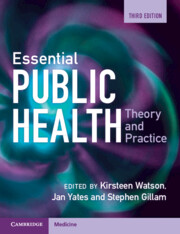Book contents
- Essential Public Health
- Essential Public Health
- Copyright page
- Contents
- Contributors
- Foreword
- Acknowledgements
- Introduction
- Part 1 The Public Health Toolkit
- 1 Health Needs Assessment
- 2 Health Information
- 3 Epidemiology
- 4 Evidence-Based Health-Care
- 5 Decision-Making and Priority Setting
- 6 Improving Quality of Care
- 7 Management, Leadership and Change
- 8 Improving Population Health
- 9 Screening
- 10 Health Protection and Communicable Disease Control
- Part 2 Contexts for Public Health Practice
- Glossary
- Index
- References
5 - Decision-Making and Priority Setting
from Part 1 - The Public Health Toolkit
Published online by Cambridge University Press: 01 December 2023
- Essential Public Health
- Essential Public Health
- Copyright page
- Contents
- Contributors
- Foreword
- Acknowledgements
- Introduction
- Part 1 The Public Health Toolkit
- 1 Health Needs Assessment
- 2 Health Information
- 3 Epidemiology
- 4 Evidence-Based Health-Care
- 5 Decision-Making and Priority Setting
- 6 Improving Quality of Care
- 7 Management, Leadership and Change
- 8 Improving Population Health
- 9 Screening
- 10 Health Protection and Communicable Disease Control
- Part 2 Contexts for Public Health Practice
- Glossary
- Index
- References
Summary
Health-care systems within most countries are resource-limited – budgets are finite and not every service one would like to provide can be funded. In publicly funded health systems, those responsible for procuring health-care need to be able to explain how taxpayers’ money has been spent. Decisions are made at both individual patient and population levels. At an individual level, the decision might be: which statin should this patient get a prescription for to lower her blood cholesterol? At a population level, the decision might be: will a health and social care commissioning organization purchase a heart-failure specialist nurse or an additional sexual health clinic?
This chapter focuses on how such decisions are made and considers a framework for priority setting, a discussion of what factors should be taken into account when comparing options, a consideration of basic health economic concepts, and an overview of ethical principles which influence decisions.
Keywords
- Type
- Chapter
- Information
- Essential Public HealthTheory and Practice, pp. 95 - 107Publisher: Cambridge University PressPrint publication year: 2023

